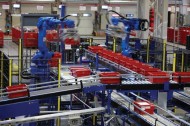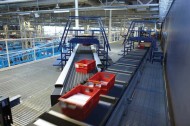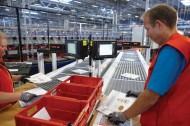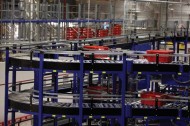 The BEUMER Group is an international leader in the design, manufacture and installation of automated handling solutions for the post and parcels sector, as well as for customers in a number of other industries.
The BEUMER Group is an international leader in the design, manufacture and installation of automated handling solutions for the post and parcels sector, as well as for customers in a number of other industries.
BEUMER Group’s two branded companies, Crisplant in Denmark and BEUMER in Germany, bring their combined experience and expertise to bear in helping post and parcels businesses optimise the performance of their sorting and distribution processes, by designing highly efficient systems that integrate their own equipment with other products. For the postal sector BEUMER and their sister company Crisplant design, build and integrate systems to do everything from automatic de-stacking to sorting into chutes or sacks.
Here in Britain, the local company BEUMER Group UK Ltd offers clients in the UK and Ireland the expertise and services of both Crisplant and BEUMER, and supports all customers who own equipment from either one.
BEUMER is currently targeting customers in the UK post and parcels sector. Among other large-scale European projects, Crisplant recently carried out a major tray management system for Norway Post, which shows clearly the benefits this type of system can bring to postal organisations, who in the current tough economic environment are looking for price-competitive solutions with low lifecycle costs, low maintenance costs and high-energy savings. Brian Jones, Sales Director at BEUMER Group UK Ltd, spoke to Warehouse & Logistics News.
Warehouse & Logistics News – Brian, we last spoke in July 2011, when your job title was Sales Director at Crisplant. Can you tell us about the changes in your business in the UK since then?
The changes are very simple, in that we have renamed the company BEUMER Group UK to fall in line with our company branding. The name change reflects that we look after all the BEUMER group activities in the UK – under this BEUMER Group umbrella, we look after both the Crisplant and BEUMER brands from initial sales enquiry through to implementation and after sales support.
WLN – Where does BEUMER Group rank in the world league of post and parcels sortation and distribution equipment suppliers?
We are consistently ranked among the world’s most innovative materials handling system providers, and if you were just to look at the parcel sortation element then we would be in the top three.
WLN – What kinds of items do your solutions move?
 We can provide solutions to move everything from parcels, flats and consumer products to industrial components and pallets, depending on the client’s need.
We can provide solutions to move everything from parcels, flats and consumer products to industrial components and pallets, depending on the client’s need.
WLN – Can you tell us about each of the two companies, BEUMER and Crisplant?
BEUMER Maschinenfabrik, to use the full name, was founded in Beckum, Germany, in 1935 as a manufacturing company producing conveyor equipment. Today BEUMER is a global player serving customers all over the world with products for conveying, loading, packaging, palletising, sortation and distribution. Similarly Crisplant was founded in Denmark, with a long history of successful innovation within both airport baggage handling and material handling as well as a highly developed customer support function. Its high-speed, automated sortation technology products sit at the heart of modern material handling, logistics and baggage handling systems.
WLN – How do the two companies work together on projects?
Each project is taken on its own merits, and our group approach is to share resources and technical information for the benefit of the customer. This ensures that the best possible proposal is produced for our customers.
WLN – Besides post and parcels, which we’re focusing on in this interview, which other industries are your target markets in the UK?
We address a wide spectrum of customers. The manufacturers and distributors we serve are involved in sectors such as apparel, automotive, beverage, consumer goods, food and pharmaceuticals. We also serve retail distributors and third-party logistics providers, as well as e-commerce, mail order and air hubs, the last two of which are of course related to parcel services. We also service the airport baggage handling sector and bulk powder handling. Our UK organisation has a well-developed Customer Support function, which services large organisations such as DHL in Ireland and British Forces Postal Services. Just last year, one of our colleagues was presented with a commendation from BFPO, in recognition of his invaluable contribution to supporting the delivery of BFPO outputs.
WLN – What proportion of your business in the UK and Ireland currently comes from the post and parcels sector? Is this proportion growing?
It obviously varies from year to year, dependent on the size and scale of projects undertaken. Currently we are seeing a lot of activity in this sector of the market.
WLN – Can you tell us about the different products and services in the BEUMER Group’s portfolio?
If we look at the postal and logistics businesses, we offer a spectrum of solutions, including high-speed sorting systems; case and pallet-handling conveyors, conveyor systems and conveyor controls; order fulfilment technologies; palletisers and depalletisers; integrated RFID-enabled solutions and software and controls. Our main objective is to help the customer reach or exceed his target of an efficient logistics operation by allowing him to reduce costs through increasing capacity, flexibility and energy efficiency.
WLN – How do you sum up your approach to designing solutions?
 As mentioned previously, when we design a system, we link all the necessary functions to maximise capacity, flexibility and energy efficiency. Really understanding the requirements of our customers is paramount to starting the design process for any system. We spend time with our customers to find out the most important aspects of the operation. We then ensure that all those factors and potential extra features are addressed in our design. Each project is unique, and the design solution has to be tailored to suit the customer’s specific requirements.
As mentioned previously, when we design a system, we link all the necessary functions to maximise capacity, flexibility and energy efficiency. Really understanding the requirements of our customers is paramount to starting the design process for any system. We spend time with our customers to find out the most important aspects of the operation. We then ensure that all those factors and potential extra features are addressed in our design. Each project is unique, and the design solution has to be tailored to suit the customer’s specific requirements.
WLN – Can you tell us about your project for Norway Post?
Posten Norge is the Norwegian Postal Service, which is state-owned. Its ambition is to develop into the leading mail and logistics corporation in the Nordic region, in tandem with becoming the world’s most future-oriented mail and logistics group. A major element is the development of an attractive workplace with a good working environment for its staff. At Posten Norge’s mail centre in Oslo, we implemented a strategy to reduce manual handling and heavy lifts, and create a single automated flow through the operation by combining a number of automated actions. The system integrates a fully automatic dynamic storage and conveyor system, linking all the receiving and preparation of letters, flats and magazines with the rest of the mail process handling and despatch areas, as well as providing a dynamic storage system for mail trays prior to delivery to the robotic palletising system. The complete installation is managed by control software written and implemented by Crisplant. Items are pre-sorted and loaded into trays and automatically conveyed via spiral conveyors for induction to the Automatic Tray Handling System – ATHS. Having reached the ATHS, the trays are automatically transported and sorted to a dynamic storage system according to their destination and departure time. The storage is a small-scale, ‘high bay’ storage system, in front of which the sorter loops in four layers to feed all levels. This dynamic storage is actually a standard storage system that, prior to this installation, was typically used in large grocery distribution centres. We developed and designed the software for the dynamic storage to interface with direct feeding from the ATHS sorter to all lanes, as one of the functionalities required by Posten Norge’s ATHS concept.
WLN – How do you sum up the benefits of this system to Posten Norge?
The speed and efficiency of operation, the safety aspects and good working environment are the most significant benefits of the system.
WLN – How readily could you offer systems with the same benefits to post and parcel customers in the UK?
Very readily. In particular, the handling of mail trays is becoming more common in the UK postal environment. Operations that require large scale handling, storage and sortation of mail trays would benefit considerably from this type of automation.
WLN – How much postal sector business have you had to date in the UK?
It is hard to put a percentage on our overall market share over the years, but we pride ourselves on a good installed base of systems.
WLN – How will the restructuring of Royal Mail in the UK affect you?
We have been a supplier to Royal Mail for many years, and have installed several systems, including the Parcel Force main hub in Coventry. Whatever restructuring takes place in the future with Royal Mail, we are hopeful that we will be considered as a future supplier, based on our track record in the industry.
WLN – What kinds of savings in maintenance and energy costs do your systems offer? What about other returns?
 In terms of energy savings, Crisplant’s LS-4000 series of sorters derive their motive power from linear synchronous motors (LSMs), rather than the more commonly used linear induction motors (LIMs). When they were introduced, the LS-4000 series were the first sorters to incorporate an LSM as their drive technology. They were specifically engineered by Crisplant to boost electrical efficiency, with the result that they use approximately 75 percent less energy than comparable sorters with LIM motors. Electrical consumption tests conducted under typical warehouse conditions demonstrate that on average the LS-4000E tilt-tray sorter consumes 2.4kW per hour of operation. In contrast energy consumption of a comparable sorter using LIM technology is 10.3kW per hour. Tests of cross-belt sorting technologies demonstrate that the LS-4000CB Cross-belt sorter consumes an average of 2.7kW per hour of operation, while energy consumption of a comparable LIM sorter is 11.0kW per hour. Other savings will always be calculated in a total cost of ownership calculation, which normally incorporate the annual costs of operating, maintaining and continuously improving the sorting system.
In terms of energy savings, Crisplant’s LS-4000 series of sorters derive their motive power from linear synchronous motors (LSMs), rather than the more commonly used linear induction motors (LIMs). When they were introduced, the LS-4000 series were the first sorters to incorporate an LSM as their drive technology. They were specifically engineered by Crisplant to boost electrical efficiency, with the result that they use approximately 75 percent less energy than comparable sorters with LIM motors. Electrical consumption tests conducted under typical warehouse conditions demonstrate that on average the LS-4000E tilt-tray sorter consumes 2.4kW per hour of operation. In contrast energy consumption of a comparable sorter using LIM technology is 10.3kW per hour. Tests of cross-belt sorting technologies demonstrate that the LS-4000CB Cross-belt sorter consumes an average of 2.7kW per hour of operation, while energy consumption of a comparable LIM sorter is 11.0kW per hour. Other savings will always be calculated in a total cost of ownership calculation, which normally incorporate the annual costs of operating, maintaining and continuously improving the sorting system.
WLN – How are you organised to address the needs of major post and parcel customers in the UK?
Our operation in the UK is set up so that we can quickly assist our customers from initial feasibility studies and detailed quotations through to project implementation and service support. As a group we also work together across regions, meaning that we in the UK work with our international colleagues to make sure we apply the right know-how and solutions for individual customer needs.
WLN – Do you offer consultancy for post and parcel clients?
We are happy to provide consultancy to our clients to see if their operation would benefit from automation.
WLN – What volume throughputs do postal organisations need to have in order to benefit from your solutions?
Any operation that consistently handles more than 2,000 items an hour could benefit from automation. We have a number of automation solutions ranging from this level to large, multi sorter systems handling over 40,000 items an hour. As mentioned, no two operations are the same, and each is looked at from a clean sheet of paper.
WLN – Can you tell us about some of your recent post and parcel projects, and what they involve?
BEUMER Group has recently completed the final stage of the largest parcel system in the UK, and we expect to be able to talk more about this installation in due course. Our recent projects also include Swedish global logistics specialists, DB Schenker Logistics, where we have designed and integrated our energy-efficient, high-speed LS-4000 sorter to automate and upgrade their Malmö parcel distribution hub in Sweden. Meanwhile TNT Post Parcel Services Ltd chose Crisplant to design and integrate the same type of energy-efficient sorter in four new sorting centres in the Netherlands.
 Australian air Express invested in two sorting systems based on Crisplant’s high-capacity, cross-belt, loop sortation system, integrating a range of in-feed stations to allow simultaneous handling of a wide range of items such as cartons, bags, tubs and satchels. The systems were installed by Crisplant into new-build facilities in Melbourne and Sydney. In France we continue to support a leading express company, Chronopost. Their Chilly-Mazarin hub is one of the most competitive express sortation platforms in Europe, with an operational capacity of 30,000 parcels per hour. The hub is the heart of a logistics network, processing 60% of the national traffic for Chronopost, with an average of 140,000 parcels per day and more that 200,000 parcels per day during peak periods. In central Europe, Austria Post built the mail centre “Briefzentrum Wien” (BZW), for which Austria Post made a changeover to complete handling and routing in totes using barcodes in a Crisplant tray management system.
Australian air Express invested in two sorting systems based on Crisplant’s high-capacity, cross-belt, loop sortation system, integrating a range of in-feed stations to allow simultaneous handling of a wide range of items such as cartons, bags, tubs and satchels. The systems were installed by Crisplant into new-build facilities in Melbourne and Sydney. In France we continue to support a leading express company, Chronopost. Their Chilly-Mazarin hub is one of the most competitive express sortation platforms in Europe, with an operational capacity of 30,000 parcels per hour. The hub is the heart of a logistics network, processing 60% of the national traffic for Chronopost, with an average of 140,000 parcels per day and more that 200,000 parcels per day during peak periods. In central Europe, Austria Post built the mail centre “Briefzentrum Wien” (BZW), for which Austria Post made a changeover to complete handling and routing in totes using barcodes in a Crisplant tray management system.
WLN – Do you publish customer case studies?
Yes, we do – see opposite page. From time to time we publish case studies of projects we have installed where the solution may be of interest to other customers. We consult with the owner of the system to ensure they are happy to have the details of their system used in a case study.
WLN – What are the steps in designing an automated post handling solution for a client?
As mentioned previously the first step to designing a system is to understand the requirements of the customer and how the operation works. From that the data acquisition stage starts, and we quickly gather information that enables a functional design flow diagram to be constructed. Once the customer accepts this as a correct interpretation of the functionality required by the system, the detailed design really starts. CAD layouts are produced along with simulations of the system critical areas. Finally a total quotation package is put together, including detailed project planning, control system, installation and service support options. When we are awarded a project we undertake a detailed emulation of the system at our facility. This means that the control system is totally built and the software finished and connected to a computer system that emulates the real life inputs to the system, without having to have the actual conveyor system in place. By using this technique we have shortened the commissioning periods on site considerably as any software issues are brought to light during this emulation process.
WLN – How quickly can you give a quote?
It depends on the size and complexity of the system in hand. An estimated ‘order of costs’ can usually be produced in a few days but a detailed quotation could take weeks or even months to produce, dependent upon the complexity of the system and the detailed required by the customer.
WLN – Where can people go if they want to see your post and parcels systems in action?
The BEUMER Group has state-of-the-art design and innovation centres, including a customer demonstration facility at the Crisplant office in Aarhus, Denmark, as well as the BEUMER office in Beckum, Germany.
WLN – Do you, BEUMER Group UK Ltd, co-ordinate the installation of the solution ‘on the ground’ in the UK, or does one or other of the two operating companies take that on?
![]() All projects are coordinated by BEUMER Group UK, with assistance from the relevant division of the company that is actually undertaking the project. We feel that having a local presence is essential in undertaking any project work, whether in the UK or globally.
All projects are coordinated by BEUMER Group UK, with assistance from the relevant division of the company that is actually undertaking the project. We feel that having a local presence is essential in undertaking any project work, whether in the UK or globally.
WLN – Similarly how does the customer support side work? What support services do you offer?
The BEUMER Group office provides support to both Crisplant and BEUMER customers in the UK and Ireland, thereby supporting our large installed base of warehouse and distribution, post and airport customers through a local and targeted presence, rapid delivery of spare parts and further improved service. If one of the companies in the group supplies a system, that company provides the hotline support to its customers. Our service and support capability covers upgrades and enhancements, hotline support, spare parts logistics, residential service, field service and customer training.
WLN – Are you exhibiting at any forthcoming trade shows in 2012?
The BEUMER Group is a returning exhibitor and speaker at the international Post Expo exhibition and conference. This year Post Expo will be held in Brussels, Belgium. Last year’s Post Expo was very exciting for us as we introduced the LS-4000flexbelt. Knowing that it is impossible simply to keep increasing the speed of sorting machines, Crisplant tackled the challenge of how to double the sorting capacity by coming up with a truly novel answer: we put two items side by side on the same cross-belt! The solution is based on the LS-4000 and the first installation has been completed in a large distribution centre in 2011, with operations expected to begin in 2012.
WLN – What external factors are driving demand for your solutions? Has the recession affected demand?
In the parcel industry the speed of the system to handle throughput in a shorter time, to allow later customer cut off time, is a common theme. Also, the enhanced data capture and data manipulation that a sophisticated parcel handling system can offer is something that more and more of our customers are demanding. With regard to the recession, the parcel industry has continued to invest in automation and is a very active market sector for the BEUMER Group.
BEUMER Group UK Ltd
Brian Jones
Tel: 00 44 7739 892 563




Comments are closed.